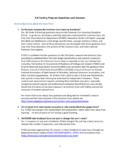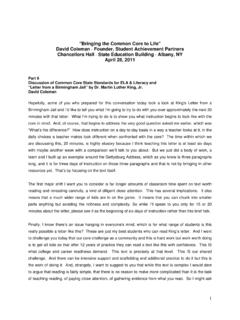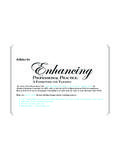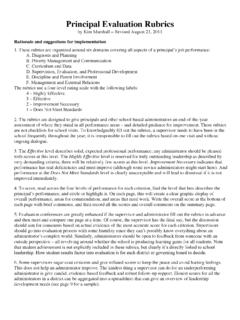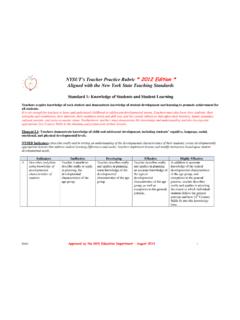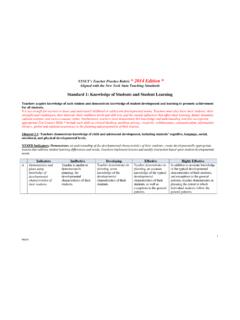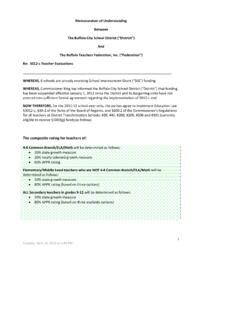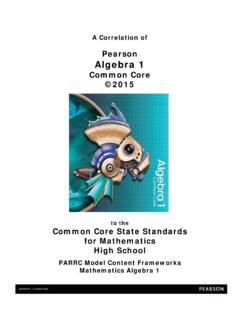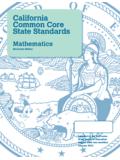Transcription of Fact Sheet Common Core and Assessments
1 What is the Common core ? The Common core State Standards adopted by the Board of Regents in 2010 identify what students in grades K-12 should know and be able to do in English language arts & Literacy in History/Social Studies, Science, and Technical Subjects (ELA) and mathematics to be prepared for success in college, careers, and life. The standards emphasize critical thinking, careful reading of fiction and non-fiction, writing with evidence, effective communication of ideas, and real-world problem solving in mathematics. K-12 teachers, higher education faculty, content experts, and state and local education leaders from both parties, in 45 states, from coast to coast worked together to develop these basic, balanced, Common sense learning expectations to ensure that every student has an effective education and a brighter future.
2 Do the Common core standards require teaching scripted lessons from the State Education Department? No. Curriculum is and always has been a local responsibility and decision. The Common core is a set of standards or expectations; it is not a prescribed curriculum. The State Education Department (SED) developed optional lesson plans as tools that teachers may use in the classroom, but these lessons are not intended to be used as scripts for delivering instruction. At the determination of a district, teachers still have flexibility to adapt lessons to best meet students needs. What is the timeline for implementation of the Common core in New York? Our mission is to make sure that every student, everywhere, gets an effective education. If we can make meaningful improvements today improvements that lead to real, immediate results we owe it to our students to do it.
3 The Common core is being phased in over 12 years; the requirement that students pass Common core Regents exams at the college and career ready level will first apply to the class of 2022. The new ELA and math Common core Assessments for grades 3-8 began in 2013. In 2014, the first Common core Regents exams will be administered in math ( algebra I) and ELA (optionally until 2016), and during the first year of the rollout students enrolled in Common core courses will have the option to take the old test in addition to the new test and have the higher score count for grading and other purposes. The Common core Regents exam in Geometry will first be administered in 2015 and the Common core algebra II exam will first be administered in 2016. Is the Common core appropriate for all students? Yes. The Common core gives all students the opportunity to receive an excellent education that will prepare them for college and careers.
4 All too often, students in low performing schools, students with disabilities, and English Language Learners are held to lower expectations and, as a result, do not receive the targeted instruction or support they need. Teachers know their students best and can adapt Common core materials in order to provide the instructional support necessary to meet the diverse learning needs of each student they teach. Does the Common core require more tests? No, the number of SED required tests have not changed since adoption of the Common core . All required state tests (grades 3-8 ELA and Math, grades 4 and 8 Science, and Regents exams in ELA, math, Science, US History, and Global), with the exception of the US History & Government and Global History & Geography, are federally required. All other tests are locally determined. Is a teacher s job performance based solely on the Common core state test scores?
5 No. As part of the evaluation system, growth on state tests is used only for about 20% of teachers statewide. For those teachers, student growth on state tests accounts for 1/5 of the evaluation score; the other 4/5 is established locally through collective bargaining and is comprised of measures such as classroom observations, student and/or parent feedback, portfolios and/or other teacher artifacts. For the remaining 80% of teachers statewide, all evaluation factors are locally determined. Great teachers matter, and we must do even more to learn from, respect, reward and retain them. The vast majority of our developing teachers can become great teachers with the proper support. But we cannot ignore the fact that there are ineffective teachers who fail to teach their students year after year. Why are there more local tests now? Pressures at the state and local level may have resulted in more local testing than needed and in test prep that crowds out quality instruction.
6 As part of the Regents initiative to keep the focus on teaching, SED will offer grants to school districts that commit to review all local Assessments and eliminate those that do not inform instruction and improve student learning. SED has approved district requests to eliminate unnecessary local testing from teacher and principal evaluation plans. The Regents acted to limit to 1% the amount of instructional time students may spend on traditional standardized tests to comply with a district s locally selected measures as part of the evaluation system. (The federally required Assessments in grades 3-8 ELA and math account for less than 1% of instructional time.) Why are the federally-required state tests important? Testing for testing s sake doesn t benefit students and nobody wants that. Students do benefit, however, when we have measures to determine whether or not every student, everywhere, has the same basic foundation to prepare them for college, careers, and life.
7 Students benefit when teachers and principals have the information they need to know which students are progressing, which students are falling behind, which are excelling, and which teachers might need extra support. In the absence of state tests, there would be no objective way for parents and the public to determine the progress of all of our students across all of our schools and districts. Fact Sheet Common core and Assessments Do state tests have to be stressful or overwhelming for students? No. Learning rigorous content can be challenging and engaging for our students. The best way to prevent those challenges from turning into stress for our children is for the adults in their lives to be supportive and affirming. Assessments are intended to be only a moment in time for students to demonstrate what they know and can do, so that adults can determine how to help students achieve even more.
8 If students are provided with the proper support and message, challenging content will build their knowledge, confidence, and future opportunities. In contrast, those who leave school and cannot find a good job may struggle without support for the rest of their lives. What are the requirements for student participation in the 3-8 tests? All students are expected to participate in the core academic program. Absences from all or part of the required academic program, including state tests, are managed consistent with district attendance policies. For accountability and statewide reporting purposes, students who do not participate in a test are reported as not tested. Schools do not have an obligation to provide alternative locations or activities for individual students during test administration. How long are the grades 3-8 tests? In grades 3-4, the typical time for completion is about 50 minutes per day for 3 days each for ELA and math.
9 In grades 5-8, the typical time for completion is 50-60 minutes per day for 3 days each for ELA and math. Additional time is provided in case some students need more time to complete their work. The overall length of the grades 3-8 state tests has been reduced for this year s administration and was also reduced in 2012-13 compared to 2011-12. What happens if a student finishes the test early? Students who complete their test before the allocated time expires should go back and check their work. After a student has finished he or she may be permitted to read silently. If all students complete the test earlier than the allotted time, the proctor may end the session. What does a Level 3 on the 3-8 tests mean? Students who score a Level 3 on the grades 3-8 ELA and math tests are on track to score at the aspirational college and career ready performance level on Common core Regents Exams, and students who score a Level 2 on the grades 3-8 ELA and math tests are on track to score at the passing level for graduation on Common core Regents Exams (until the required passing score is raised to the college and career ready level in 2022).
10 A Level 2 score does not mean a student has failed the 3-8 Assessments . Are New York educators involved in the development of state tests? Every question on the state Assessments was written specifically for New York, field tested with New York students, and reviewed and edited multiple times by New York educators to help ensure that the questions measure what they are intended to measure, are clear, and are fair to all students. Why doesn t SED release all grades 3-8 test questions? Approximately 25% of the questions were released with detailed rationales and samples of student work after the spring 2013 test. SED cannot release all test questions because there would not be enough questions for use in future tests without a significant increase in field testing. SED would like to release significantly more test questions and has requested new funds to reduce field tests and allow for more test questions to be released.
